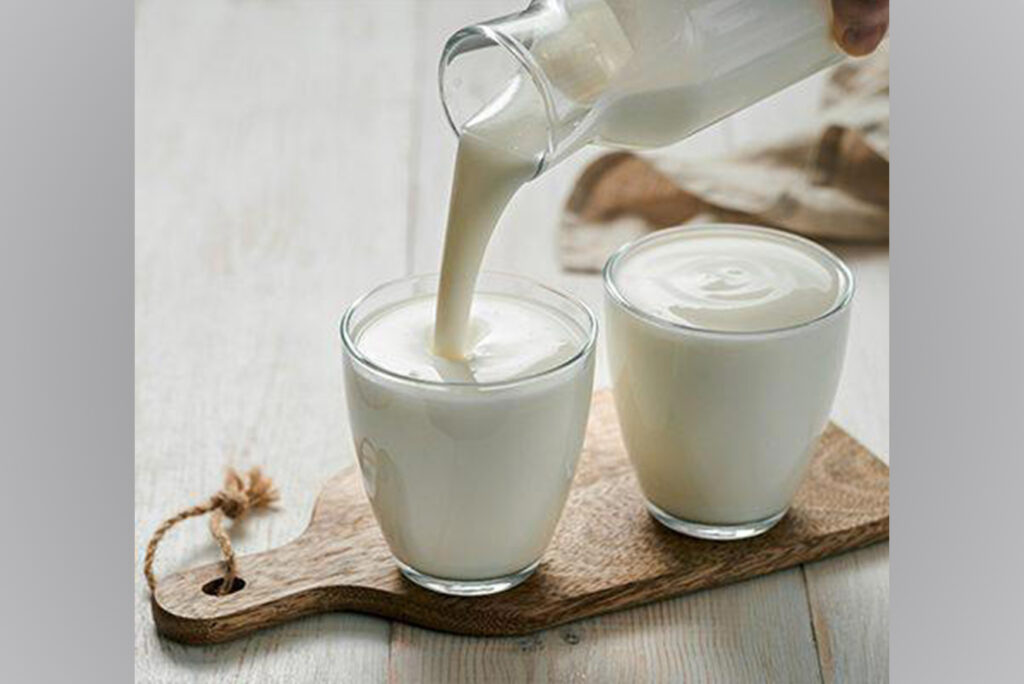When it comes to dairy foods, the big three: milk, cheese and yogurt, are often the focus of information we share. As the benefits of fermented foods have gained popularity, there is another dairy food that has become a super star: kefir. While some of the more well-known fermented dairy foods include yogurt, cheese, buttermilk and sour cream, kefir has a unique nutritional profile and taste. Let’s dive in and learn more about kefir.
What is Fermentation?
Fermentation is a natural process through which microorganisms like bacteria, yeast and molds convert organic compounds – such as sugars and starch – into alcohol or acids. This not only acts as a preservation method but also enhances the nutritional profile of the food. In the case of dairy foods, fermentation typically involves the transformation of lactose, the sugar in milk, into lactic acid by beneficial bacteria. This process gives fermented dairy foods their characteristic tangy taste and creamy texture.
What is Kefir?
Kefir is a bit thinner than yogurt and has a consistency and taste similar to drinkable yogurt. Kefir is made by fermenting milk with kefir grains—a unique combination of bacteria and yeast. Kefir grains are not a traditional grain like wheat or oat, but grain-like colonies of yeast and lactic acid bacteria that resemble a cottage cheese in appearance.
Over a day-long period, the microorganisms in the kefir grains multiply and ferment the lactose sugars in the milk, turning it into kefir. The kefir grains are removed from the liquid and can be used again as a starter culture (similar to a sourdough starter).
What is left is a drink with a slightly effervescent zing, filled with probiotics and nutrients. This unique process not only preserves the milk but also enriches it with probiotics, vitamins and minerals.
A Probiotic Powerhouse
The probiotic content of kefir is unparalleled, containing a wider range of beneficial bacteria than yogurt. These live microorganisms can help balance the gut microbiome, improving digestive health and bolstering the immune system. Regular consumption of kefir can aid in combating gastrointestinal issues like bloating, constipation and diarrhea. Furthermore, a healthy gut microbiome is linked to numerous other health benefits, including improved mental health and reduced inflammation.
Nutritional Benefits of Kefir
Kefir is a nutrient-dense beverage. It’s an excellent source of protein, calcium, B vitamins, potassium and magnesium. These nutrients are essential for maintaining strong bones, facilitating proper muscle function and supporting a healthy nervous system. The fermentation process also increases the availability of these nutrients, making them easier for the body to absorb.
Lactose-Friendly
For those with lactose intolerance, kefir offers a ray of hope. The fermentation process significantly reduces the lactose content in kefir, making it more digestible for people who typically avoid dairy foods. This means that even those who can’t enjoy other dairy foods might be able to reap the nutritional benefits of kefir without discomfort.
Versatile and Delicious
Beyond its health benefits, kefir is incredibly versatile and can be enjoyed in numerous ways. Drink it plain for a refreshing and tangy beverage, blend it with fruits for a nutritious smoothie, or use it as a base for salad dressings and marinades. Its slightly acidic nature can also be a fantastic tenderizer for meats, making it a useful ingredient in cooking.
In conclusion, kefir is a nutritional powerhouse that can enhance your health in myriad ways. Whether you’re seeking to improve your digestive health, boost your nutrient intake, or simply enjoy a tasty and refreshing beverage, kefir is worth exploring. So why not start today? Add a splash of kefir to your diet and discover the multitude of benefits this fermented wonder has to offer.
